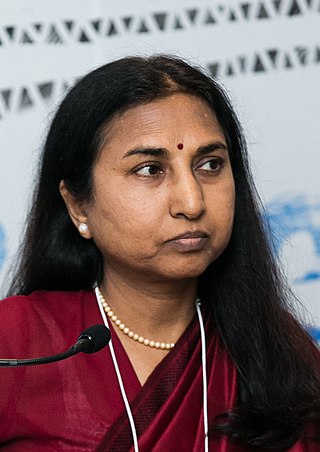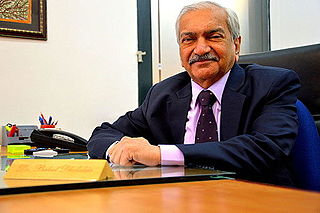The Licence Raj or Permit Raj is a pejorative for the system of strict government control and regulation of the Indian economy that was in place from the 1950s to the early 1990s. Under this system, businesses in India were required to obtain licences from the government in order to operate, and these licences were often difficult to obtain.
Deepak Kumar Lal was an Indian economist, writer, professor and consultant focused on the subject of liberal economics. Best known for his 1983 book, The Poverty of “Development Economics", Lal was also known for bucking conventional assumptions and for multidisciplinary approaches to thorny economic problems. His proposed solutions were typically in the vein of Hayek or the Austrian School of economic thinking.

Prabhat Patnaik is an Indian Marxist economist and political commentator. He taught at the Centre for Economic Studies and Planning in the School of Social Sciences at Jawaharlal Nehru University in New Delhi, from 1974 until his retirement in 2010. He was the vice-chairman of Kerala State Planning Board from June 2006 to May 2011.

Jayati Ghosh is an Indian development economist. She is the Chairperson of the Centre for Economic Studies and Planning at the Jawaharlal Nehru University, New Delhi and her core areas of study include international economics, employment patterns in developing countries, macroeconomic policy, and issues related to gender and development.

Bina Agarwal is an Indian development economist and Professor of Development Economics and Environment at the Global Development Institute at The University of Manchester. She has written extensively on land, livelihoods and property rights; environment and development; the political economy of gender; poverty and inequality; legal change; and agriculture and technological transformation.

Mihir Rakshit is an Indian economist, known for his work on fiscal, monetary and other policy, especially issues that concern developing economies. Originally from Chittagong, which is now in Bangladesh, he did his graduation from Presidency College, Calcutta and post-graduation from the University of Calcutta. He taught at the departments of Economics of The University of Calcutta, The University of Burdwan, Presidency College Calcutta, and Indian Statistical Institute Calcutta, as faculty. He also taught at Delhi School of Economics and Erasmus University Rotterdam, as visiting faculty. He served the Reserve Bank of India for two terms as a member of its central board of Directors. He was Editor-in-chief of the open access quarterly journal Money and Finance published by ICRA Limited from 1997 to July 2016.

Eswar Shanker Prasad is an Indian-American economist. He is the Tolani Senior Professor of International Trade Policy at Cornell University and a senior fellow at the Brookings Institution, where he holds the New Century Chair in Economics.

Bakul Harshadrai Dholakia is the former Director of Indian Institute of Management Ahmedabad (2002–2007). Prior to that, he was the Dean at Ahmedabad (1998–2001) and a professor in Economics He was also the Director General of International Management Institute, New Delhi. Prior to joining IMI New Delhi, he was the Director of Adani Institute of Infrastructure Management and Gujarat Adani Institute of Medical Sciences, Bhuj.

Arvind Panagariya is an Indian-American economist who is the Jagdish Bhagwati Professor of Indian Political Economy at Columbia University and is also the Director of Deepak and Neera Raj Center on Indian Economic Policies at School of International and Public Affairs at Columbia University in New York City. He served as first vice-chairman of the government of India think-tank NITI Aayog between January 2015 and August 2017. He is a former Chief Economist of the Asian Development Bank. He was awarded the Padma Bhushan by the President of India in 2012 for his contributions in the field of economics and Public Policy. He is an authority on free trade and widely regarded as the foremost expert in the world on Indian economy.

Pranab Bardhan is an Indian economist who has taught and worked in the United States since 1979. He is Professor Emeritus of Economics at the University of California, Berkeley.

Sugata Marjit is the former Vice Chancellor of the University of Calcutta and currently the First Distinguished Professor at Indian Institute of Foreign Trade and the Project Director of Centre for Training & Research in Public Finance and Policy (CTRPFP) [A Ministry of Finance, Government of India funded initiative]. He is a Ph.D. at the University of Rochester and currently the Editor of South Asian Journal of Macroeconomics and Public Finance. He used to be the Director of Centre for Studies in Social Sciences, Calcutta from March 2007 to March 2012 and Reserve Bank of India Chair Professor of Industrial Economics at CSSSC till September, 2019. On 15 July 2015 he took the charge as an interim Vice-Chancellor of the prestigious University of Calcutta, Kolkata, India.

Abhijit Sen was an Indian economist who focused on studying rural development. Sen was appointed to the Planning Commission of India between 2004 and 2014 and held a number of policy making positions in India. Amongst his works included recommendations toward establishment of minimum support price for farm produce and a universal public distribution system.
Barid Baran Bhattacharya was an Indian economist and educationist. He was vice-chancellor of Jawaharlal Nehru University. He was also Director and Professor at the Institute of Economic Growth, Delhi.

The Institute of Economic Growth (IEG) is an autonomous, multidisciplinary Centre for advanced research and training. Established in 1958, its faculty of about 23 social scientists and a large body of supporting research staff focus on areas of social and policy concern.

National Council of Applied Economic Research (NCAER) is India’s oldest and largest independent, non-profit, economic policy research think tank. Established in New Delhi in 1956, it acquired considerable national and international standing within only a few decades of its founding. It is one of a handful of think tanks globally that combine rigorous analysis and policy outreach with deep data collection capabilities, especially for household surveys.
Santosh Mehrotra is a development economist, whose research and writings have had most influence in the areas of labour, employment, skill development, on the relationship between human development and economic growth, child poverty, and the economics of education. He was an economic adviser in the United Nations system in New York City, Italy, and Thailand (1991–2006), and technocrat in the government of India (2006–2014), apart from making contributions to academic research since the mid-1980s. He has also in recent years established a reputation as an institution-builder in the field of research in India, despite facing difficult odds. He brings a combination of professional experience: with the Indian government as a policy maker and adviser, with international organisations as a technical expert, having lived on three continents and travelled to 63 countries providing technical advice to governments; and as an academic whose research work has been translated into French, Spanish, Portuguese, Italian and German.

Ashok Gulati is an Indian agricultural economist and a former chairman of the Commission for Agricultural Costs and Prices (CACP), the advisory body of the Government of India on food supplies and pricing policies. Gulati was instrumental in the hiking the minimum support price of several food grains. Currently he is Infosys chair professor for Agriculture at Indian Council for Research on International Economic Relations (ICRIER). He is also a member of the Task Force on Agriculture set by the prime minister under NITI Aayog and chairman of the Expert Group on Agriculture Market Reforms (2015). He was an active member of the high-level committee set up by the NDA Government to restructure and reorient Food Corporation of India in order to improve its operational and financial efficiency.
Robert A. Blecker is an American economist who is currently a Professor in the Department of Economics at American University in Washington, DC. He is also Affiliate Faculty of the American University School of International Service and Center for Latin American and Latino Studies, and a research associate at the Economic Policy Institute and Political Economy Research Institute. His research has made contributions to the fields of post-Keynesian and neo-Kaleckian macroeconomics, open economy macroeconomics, international trade theory and policy, global imbalances and the U.S. trade deficit, the North American Free Trade Agreement, the economy of Mexico, export-led growth, and the theory of balance-of-payments constrained growth.

V. R. Panchamukhi, is an Indian Economist and Sanskrit scholar. He was born on September 17, 1936, in Dharwad, Karnataka. He is the eldest son of Vidyaratna Shri R. S. Panchamukhi, an archaeologist and indologist and Sanskrit Scholar.
Anusha Chari is an Indian-American economist who is a professor of economics and finance at the University of North Carolina at Chapel Hill, where she directs the Modern Indian Studies Initiative. She is also a research associate of the National Bureau of Economic Research in the international finance and macroeconomics programs, a research fellow of the Center for Economic and Policy Research, a senior research fellow of the Kenan Institute of Private Enterprise, and the Deepak and Neera Raj Center on Indian Economic Policies of Columbia University.















